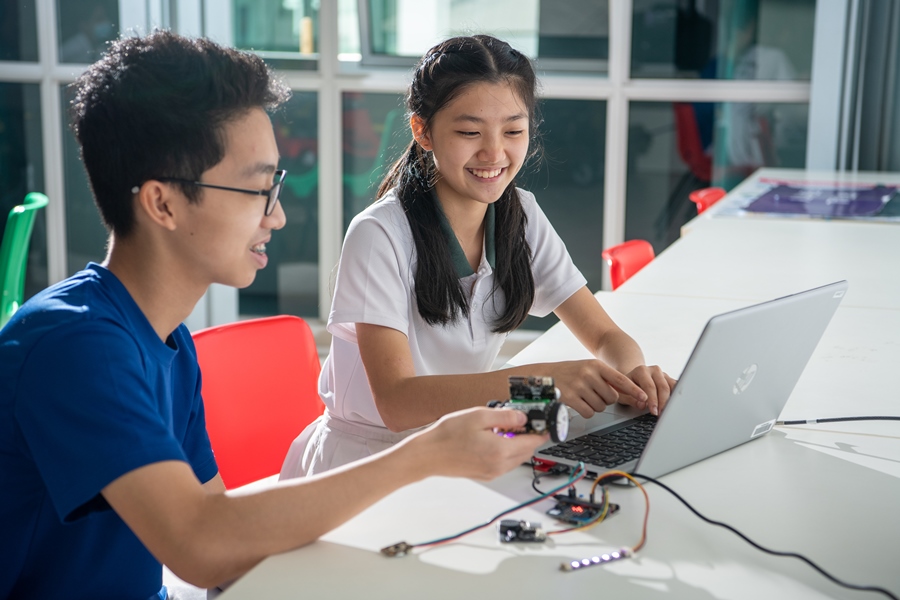Learning Technology

The AHS Creators’ programme is a 3-year integrated programme where each student will go through minimally 50 hours of computational and design thinking during their secondary school journey in Anglican High School. Equipping students with technological skills will enable them to have future-ready dispositions and become value-creators, both for themselves and for others in the community.
‘O’ Level Computing
Starting 2023, we will be offering 'O' Level Computing at Anglican High School. Computing at the 'O' level aims to provide students with the foundation to continue with further studies in computing skills to participate in a rapidly changing technological environment. The two-year course at upper secondary level enables students to:
- Apply logical reasoning and algorithmic thinking in analysing problem situations and developing solutions.
- Develop simple program through the use of appropriate programming language(s), such as Python.
- Understand how and where information communications technology (ICT) is used in daily life.
- Understand and explain the ethical, social and economic issues associated with ICT.
Artificial Intelligence & Python Coding
Our Secondary Two students undergo a semester-long module on Artificial Intelligence (AI) and Python Coding. Through lessons on the history and development of AI, students are better able to appreciate its real-life applications. Not only do they learn the basics of Python coding and apply it to control a virtual car, they also learn how images are processed using key facial detection points to make animated GIFs.
Making and coding of drones
Students went through the designing, making and programming of drones during the mid-year programme where they are exposed to STEM. Drone designing looks at the creative and human centered application of Mathematics, Science and Technology and provides a platform for students to problem solve so as to address authentic problems. Research has also proven that drone programming significantly improves students’ learning of spatial visualization and sequencing skills.
Coding using Microbits
As part of the Creators’ Programme, students also learn how to do block programming via the use of microbits. An argument propounded by Steve Jobs himself said that coding teaches an individual how to think and research has proven that coding can provide students with brain gains in areas such as information processing, logic, problem solving, experimentation and creativity. This is of importance especially when Singapore moves towards transforming into a Smart Nation with digital-literate students as the corner-stone.
Game Design and Development
The “Game Design and Development” workshop is designed for students to gain exposure to online programming and equip them with computational thinking skills. It is programmed by GameMaker Studios 2.0, a tool designed to empower students to make new and innovative games as well as prototype ideas in the fastest and most intuitive way possible across multiple target platforms. It is intended primarily as a tool for making 2D games and comes with a number of tools and editors to help students realise their dreams and ideas, with their final project being ported across multiple platforms from the same initial base resources.
Students acquire many practical skills such as trial and error, discipline, patience, problem-solving through this workshop. Game design is regarded as a prime example of a constructionist activity especially in the age of digital play (Papert, 1991) and research have shown that students’ capacity to create and modify digital games with and for each other offers them a tremendous advantage in understanding the ever-changing nature of digital media and what it means to problem solve and participate. (Y.B. Kafai & Burke, 2015).
Block programming using Collaborative Robo-Arm
One of the workshops under the Creators’ Programme is the Collaborative Robo-arm workshop which is designed to utilize a fully programmable 6 axis industrial Robotic Arm to give students an understanding of block-based programming and robotic machinery. In this workshop, students learn how the 4th Industrial revolution is impacting our society and they programme a robotic arm as part of the workshop deliverables.
Augmented Reality/ Virtual Reality workshop
Augmented/ Virtual reality in education leverages on the use of technology to provide virtual scenarios to simulate situations that might occur in actual settings so as to bring about the desired learning outcomes. EdTech (2019) cited in their study showing that AR and VR can help with memory retention and recall as students learn in an immersive environment. In this workshop, students had a crack in creating their own AR and VR images and were exposed to this evolving technology as they learn for life.

